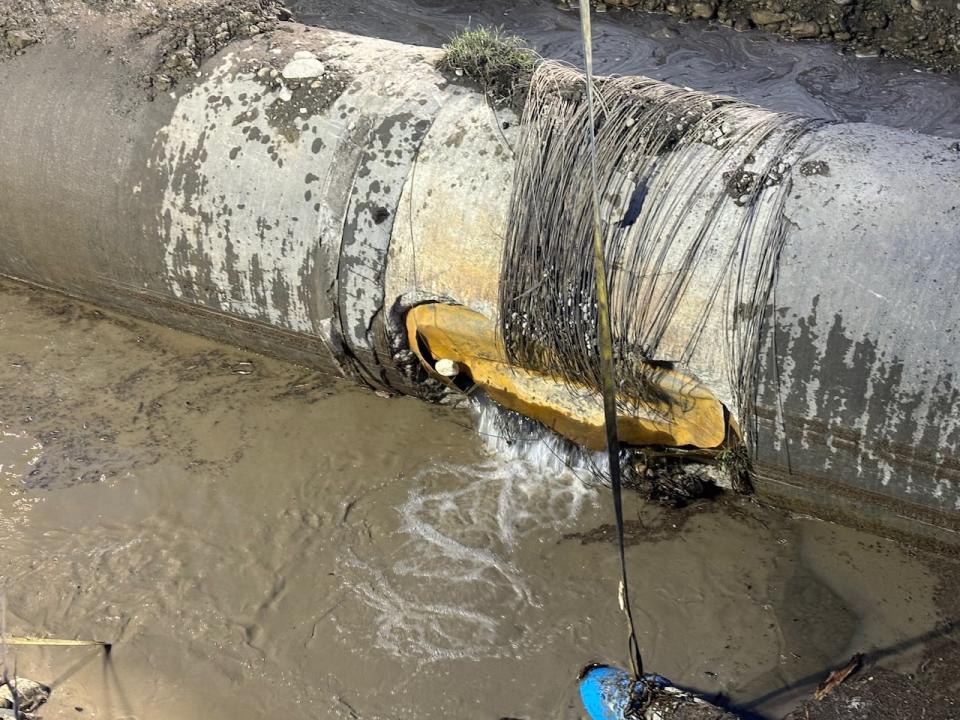City of Calgary calls for 3rd-party review into why water main ruptured
City officials have confirmed that there will be a full, third-party review into what caused the catastrophic water feeder main break that created an ongoing crisis for Calgary's water supply.
"I know you want to understand what happened to this pipe in the first place, and I do too," said Calgary Mayor Jyoti Gondek on Tuesday morning.
"It's for that reason that I called for a third party to do a complete incident review of this situation."
David Duckworth, chief administrative officer for the City of Calgary, says the review will be guided by an expert panel.
"The scope of this review will include, but not be limited to, understanding the factors that contributed to the original pipe failure, understanding of our current practices for inspection and asset sustainability, and it will include recommendations for specific actions to improve raw water supply resilience moving forward."
The review panel will include academics, water industry and engineering experts and government entities.
"I know that this review will go a long way to providing both answers and transparency for the public," said Gondek.
City officials also provided an update on the state of two workers who were injured while working on the feeder main rupture site.
One of them is a City of Calgary employee who has now returned to work on modified duties. The other, a contractor, is still in the hospital, according to Coby Duerr, deputy chief of the Calgary Emergency Management Agency (CEMA).
5 hot spots being repaired
On Tuesday morning, Duckworth said that crews are working "literally around the clock" to repair the additional stress points within the pipe that were identified.
"These hot spots are not leaks," said Duckworth, adding that the city's hopes are to avoid any potential additional breaks in the feeder main.
All of the hot spots are being repaired concurrently, and all five are in the two new areas on 16th Avenue N.W. that were closed off at midnight on Monday.
Kerry Black, an assistant professor and Canada Research Chair with the Schulich School of Engineering in the department of civil engineering at the University of Calgary, says it's fortunate that the hot spots were found while crews were repairing the initial June 5 rupture.
"A lot of these pipes are designed to be in the ground for a really long time," Black said during an interview with the Calgary Eyeopener Tuesday morning.
The Bearspaw south feeder main ruptured just 49 years into what the city says is meant to be a 100-year lifespan. Black says that for pipes as large and critical as these water feeder mains, expecting it to survive for such a long lifespan isn't necessarily unusual.
"Now, this one didn't quite make it to 100 years, but again, that's due to some factors that we're going to have to spend some time figuring out, doing a little bit of forensic engineering."
LISTEN | Expert discusses what those hot spots could look like:
The city still has not confirmed the cause of the break, and Black says any number of factors could have contributed to the rupture.
"You can see in the pictures of the pipe that have come out, that exposed steel is concerning."

And the components being shipped to Calgary from San Diego — courtesy of that city's water authority — are en route and expected to arrive today, according to officials.
However, the city says its three- to five-week timeline for conserving water while the repairs continue remains the same.
The city's general manager of infrastructure services, Michael Thompson, said the city expected to provide an updated repair schedule by the end of this week.
The mayor says Calgary used 450 million litres of water on Monday, which is below the 480-million litre threshold.

